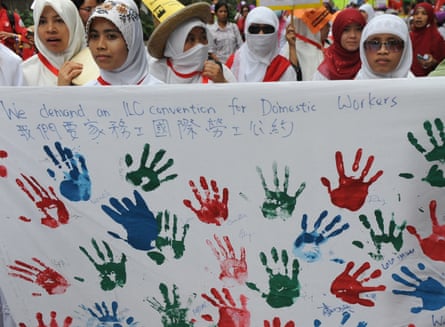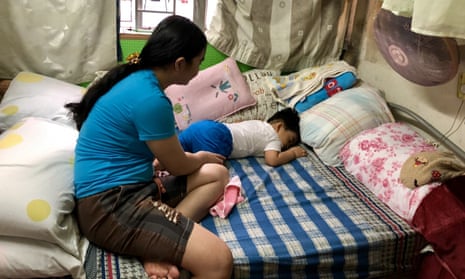The sun had not yet risen in Hong Kong when Sally*, a domestic worker, was woken and told she needed to leave immediately. As she lay on the sofa, confused, Sally saw her employer standing over her with a piece of paper he wanted her to sign. It was a resignation letter he had written for her. She was being let go because she was pregnant. Her employer, a German man in his 50s, is the father of the child.
Sally, 39, from Manila in the Philippines, is one of the 390,000 domestic workers – mainly from poorer Asian countries – who keep Hong Kong functioning. One in every 20 employees in Hong Kong is a migrant worker, and most of these are women of child bearing age.
But because the terms of their working visas require maids to live at their employers’ homes, those who become pregnant can be fired by employers looking to avoid accommodating a baby and paying for maternity leave. They become homeless overnight, and two weeks later their residency permit expires. If they stay in Hong Kong illegally, they won’t be able to access healthcare or register the births of their children, who become stateless.
“This is a humanitarian tsunami,” says Kay McArdle, a Hong Kong-based lawyer and gender rights advocate. “These women and children are incredibly vulnerable.”
Sally had been working for her employer for three years, and for much of that time they were in a relationship, she says. Despite sharing a bed, her employer still expected her to get up at dawn to tend to the apartment. Each evening she was expected to have a meal waiting for him as soon as he came home from work. On Sundays, her day off, they would spend time together as a couple. But everything changed when she told him she was pregnant.
“He wanted to abort [the baby]. I said no. He would not accept this, so I moved to the sofa,” she says.
When she was thrown out, she stayed in various guesthouses. But her money ran out before her son, Peter*, was born. Now the mother and baby are staying in a shelter for pregnant former maids and new mothers that have been made homeless, run by local charity Pathfinders. Each year, the organisation deals with almost 1,000 cases of maids who run into difficulties when they get pregnant. It assists the women with visa and legal issues. Pathfinders is helping Sally petition her employer, who is denying he is the father, for child support.
The Hong Kong government’s labour department told the Guardian: “An employer is prohibited from dismissing a pregnant employee from the date on which she is confirmed pregnant by a medical certificate until the expiry of her maternity leave, except in serious disciplinary cases of dismissal due to the employee’s serious misconduct.”
However, vulnerable foreign workers are often unaware of their rights.
“We know we see a fraction of cases, and the reality is employment discrimination of pregnant foreign domestic workers is much higher,” says Catherine Gurtin, CEO of Pathfinders. “Employers find other pretexts for firing their maid when she is pregnant, such as accusing them of theft.”
Pathfinders has successfully helped women petition for child support, and against unfair dismissal and gender discrimination. Of the cases they handle, 31% involve petitioning against unfair dismissal, and 18% of cases are for accessing child support, which is possible if the father is a resident of Hong Kong.
Lin*, a former domestic helper, is preparing to return to the Philippines with her two-month old daughter. When her employers discovered she was pregnant they reduced the amount of food she was allowed, she says.
Fired and made homeless soon after, she is now living in the Pathfinder shelter. Her one request to the charity was to book her a flight that arrives at night, as she wants to reach her hometown in the dark to avoid people seeing her and the child.
“In my neighbourhood they will think: ‘She is not good because she got pregnant in Hong Kong.’ I feel so shy to go back in the Philippines,” she says.

The loss of housing and income means these women can be trapped in abusive relationships. Anna-Maria* lives in a small, dark apartment in a dilapidated high-rise building with her baby son, Emmanuel*, and her partner, who is a Hong Kong resident.
“My partner was very angry with me when I became pregnant. He didn’t want the obligation, he wanted me to go back to the Philippines. When I was four months pregnant I started bleeding because of the stress,” she says.
For the first three months of Emmanuel’s life his father refused to acknowledge him. The mother and son lived in a hostel. The newborn was badly bitten by bed bugs. While Anna-Maria and her partner’s relationship has improved, she is worried the situation could flare up again.
Her partner gives her money for food and she is slowly putting some aside, she says, so that she can flee with her baby if the living situation becomes dangerous.
“I don’t know what is in his mind, so I need to prepare myself,” she says. “I’m a little bit scared.”
* Names changed to protect identities
